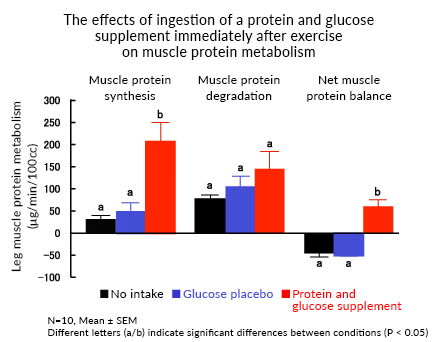Postexercise protein intake enhances whole-body and leg protein accretion in humans
Levenhagen DK, Carr C, Carlson MG, Maron DJ, Borel MJ, Flakoll PJ
Med Sci Sports Exerc 2002; 34: 828-837
Objective
To determine the potential of postexercise nutrient intake to enhance the recovery of whole-body and skeletal muscle protein homeostasis in humans.
Methodology
Ten healthy subjects (5 male, 5 female) were each given either a protein and glucose supplement (10g of protein, 8g of glucose, 3g of fat), glucose placebo (0g protein, 8g glucose, 3g fat), or no supplement, and a crossover study performed. Immediately after a one-hour recumbent bicycle exercise (at 60% of VO2) subjects were given a protein and glucose supplement or glucose placebo, and muscle protein metabolism evaluated three hours after the exercise using a stable isotope labeling (Phe2H5 -Phe) method to measure the arteriovenous difference.
Results
Compared to the group that took no supplement, the group consuming a glucose placebo immediately after exercise exhibited no increase in protein synthesis. Net proteolysis was found to equate to protein intake. By contrast, the group consuming a protein and glucose supplement immediately after exercising exhibited greater protein synthesis than when consuming no supplement or when only consuming a placebo, showing a net gain in protein synthesis.
Conclusions
The results show that promoting greater muscle protein synthesis post-exercise requires not only an intake of glucose but also protein.









